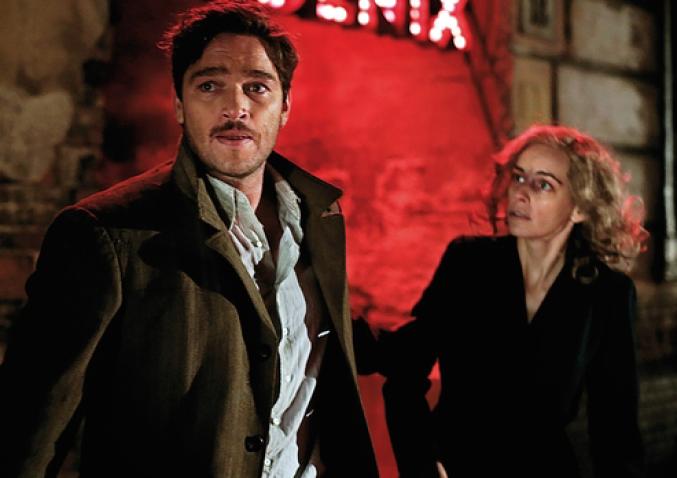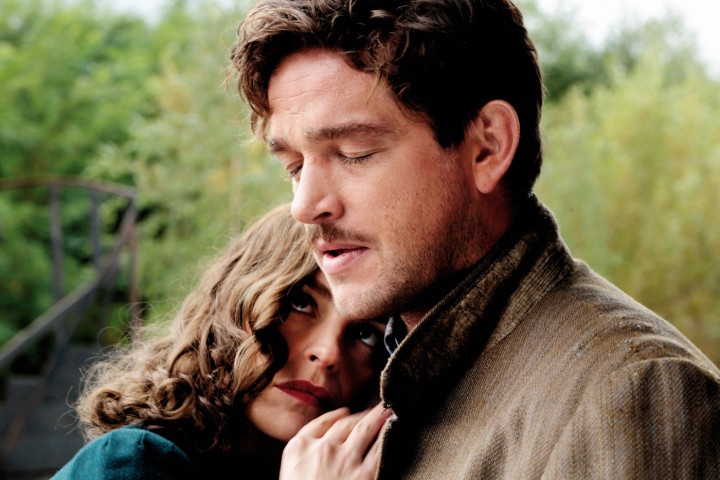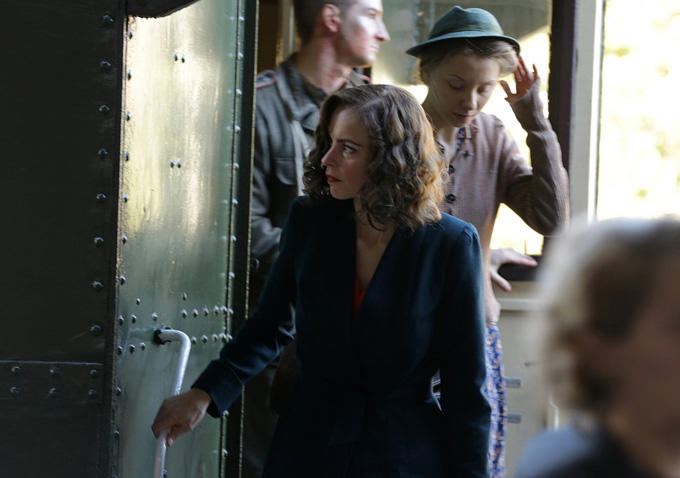Christian Petzold is a filmmaker whose work has escaped me — which translates into saying that German movies still don’t much make it to the provinces. If Phoenix is any barometer of his work, that’s a great pity for us, because this film at least belongs on the list of best films of 2015 to date. I know a lot of people who will take one look at the film’s premise and shy away from it as “another Holocaust movie,” and, yes, that’s part of the story — the basis in fact — but Phoenix is a much more than you might expect. It’s a kind of post-war neo-noir with elements of Billy Wilder’s A Foreign Affair, Carol Reed’s The Third Man, and Hitchcock’s Vertigo — without ever leaning too heavily on any of these, owing to the themes of the story. Oddly, Vertigo — which would seem to have the least connection — is thematically its closest antecedent.
Nina Hoss (in her sixth film for Petzold) stars as Nelly Lenz, a Jewish nightclub singer, who was shot in the face and left for dead by the Nazis. (The specifics of this only become clear over the course of the film.) However, she wasn’t dead and she has been given a theoretical new lease on life by a plastic surgeon, who — at Nelly’s insistence and against his advice — reconstructs her face to an approximation of her old self. But it’s only that — an approximation — and it does nothing to restore Nelly’s sense of self. Her friend Lene (Nina Kunzendorf) is adamant that Nelly put her old life behind her and move to a modern apartment in Haifa, making a complete break with Europe and the past. But Nelly is less certain of this plan, not in the least because she’s haunted by the idea of her missing husband, Johnny (Ronald Zehrfeld) — despite Lene’s insistence that Johnny is the one who turned her over to the Nazis.
At night, Nelly prowls the ruins of Berlin searching for Johnny, who she finds working in a nightclub called Phoenix in the American sector. The changes in Nelly are enough to make her unrecognizable to him. However, Johnny sees just enough of Nelly in this woman that he thinks he can transform her into a reasonable copy of his dead (he believes) wife — reasonable enough that he can palm her off as Nelly and collect her inheritance. Rather than tell him she really is his wife, she opts to go ahead with his scheme in the belief — never openly voiced, like many things in the film — that somewhere along the way Johnny will realize who she is.
The premise may be both a little far-fetched and pushed beyond its limits. It certainly falls into the realm of twisted romantic melodrama. But that’s only surface — and it only holds up to negative scrutiny if you don’t realize that Nelly is both learning to be Nelly all over again and trying to be Johnny’s idea of Nelly — and trying to get Johnny to see she really is his wife, but without being too obvious. It’s emotionally complex and an amazing accomplishment on both acting and filmmaking levels. The film’s structure as a kind of mystery concerning when Johnny will realize who this Nelly is, whether or not he really did turn her in — and perhaps most of all, when Nelly will see Johnny and herself for what each is — drives the film with compelling urgency.
The film’s atmosphere is wonderfully achieved. The aura of the grimness of post-war Berlin is almost tangible, as is the sense of characters who are terrified to look at the past, stranded in the present and incapable of imagining the future. The decision to build the film musically — and in a sense dramatically — around the Kurt Weill-Ogden Nash song “Speak Low” verges on genius, and sets the stage for one of the bleakest (yet ambiguous) climaxes in living memory. Altogether a first-rate film that should be seen. Rated PG-13 for some thematic elements and brief suggestive material.
Playing at Fine Arts Theatre.









Before you comment
The comments section is here to provide a platform for civil dialogue on the issues we face together as a local community. Xpress is committed to offering this platform for all voices, but when the tone of the discussion gets nasty or strays off topic, we believe many people choose not to participate. Xpress editors are determined to moderate comments to ensure a constructive interchange is maintained. All comments judged not to be in keeping with the spirit of civil discourse will be removed and repeat violators will be banned. See here for our terms of service. Thank you for being part of this effort to promote respectful discussion.